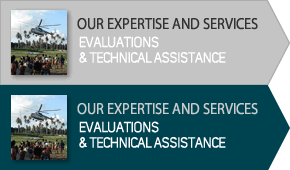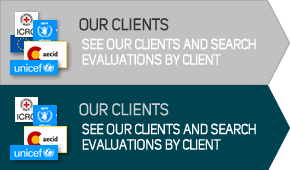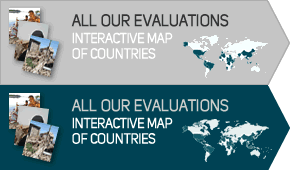The scale and breadth of DARA’s field research and evaluation work gives the organisation an unparalleled overview of what works well and what does not in aid – based on direct experience and evidence from the field:
Study Value for money in the humanitarian sector EVAL
DARA, in cooperation with Indevelop and GRM International, carried out a study on value for money in the humanitarian sector for the Swedish International Development Cooperation Agency (Sida) and one of its long-standing partners in contexts strained by armed [...] Read more...
Technical Assistance to the AECID’s Humanitarian Office in the context of Haiti’s crisis and the Spanish EU Presidency EVAL
Haiti’s earthquake hit the country on the 12th of January. The following day, the Head of the Spanish Cooperation’s (AECID) Humanitarian Office contacted DARA to receive its support for the international emergency response. Spain in the context of the EU Presidency [...] Read more...
Technical assistance for AECID for the next CERF Advisory Group Meeting EVAL
Spain has become the fourth largest donor to the CERF (Central Emergency Revolving Fund) in 2009 mainly due to currency fluctuation. AECID (The Spanish Development Cooperation Agency) contracted DARA to prepare a background paper highlighting what is the CERF, [...] Read more...
Assessment of the Aid provided by the Spanish Bilateral Cooperation within the Health Sector EVAL
The DCSyM (Sectorial and Multilateral Cooperation Directorate) of the Spanish Agency for International Development Cooperation (AECID in its Spanish acronym) has selected DARA to review the aid provided by the General Administration of the State (AGE) to the health [...] Read more...
Comparative Analysis of Humanitarian Intervention Models of the Spanish Cooperation. Case Studies: OPT, Haiti/Panama and Mozambique EVAL
The humanitarian reform process of the Spanish Cooperation initiated in the previous government includes a controversial element: the new role of the Spanish Cooperation as a direct implementing partner of humanitarian aid. Some independent studies have raised [...] Read more...
The UN Emergency Response to the 2007 Tabasco And Chiapas, Mexico EVAL
The purpose of this study was to establish how well the UN System, and individual UN-agencies, succeeded in responding to the emergency caused by the 2007 floods that affected Tabasco and Chiapas, in Mexico. The objective was to assess the most important strengths [...] Read more...
Technical Assistance to IBIS: Elaboration of West African Strategy EVAL
IBIS works in five regions, with the most recent being West Africa. The regional presence covers a country programme in Ghana and humanitarian/rehabilitation project implementation in Liberia and Sierra Leone. The West Africa programme is expected to grow considerably [...] Read more...
HAP Audit of Danish Church Aid, 2008 EVAL
Audited Danish Church Aid Headquarters against the HAP standards. HAP standards have been introduced to make humanitarian action accountable to intended beneficiaries through self-regulation. An agency certified against the HAP Standard means that it has been [...] Read more...
HAP Audit of Mercy Malaysia, 2007 EVAL
MERCY Malaysia has gone through a 100% growth curve in the last 5 years. In 2005 they recognised that they needed to consolidate and strengthen their position as well as seek quality assurance. They have demonstrated total commitment to align themselves with key [...] Read more...
Study on Complementarities, Competition and Convergence in Humanitarian Quality Assurance EVAL
The project consisted in elaborating an independent mapping of complementarities, areas of competition, and options for closer cooperation between members of a group of humanitarian quality assurance organisations. The Group had set in place a number of activities [...] Read more...




Share this